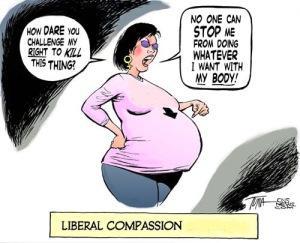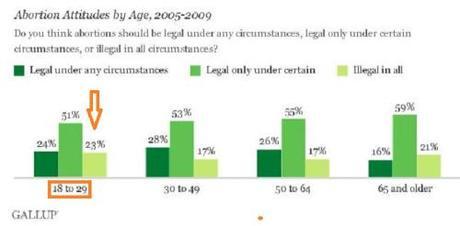Millennials (aka Generation Y) are those aged 18 to 29 whose birth years range from the early 1980s to the early 2000s.
Millennials can be faulted for many things. See, for example:
- The iY Generation: I’m scared for our future…
- More deep thoughts from the iY Generation…
- More college students support post-birth abortion
But there’s one positive thing we can say about millennials — they are more pro-life than previous generations of American young people.

Gallup Poll analysis of U.S. public opinion trends on abortion shows that generational differences in support for broadly legal abortion have diminished over the past decade, mainly due to young adults (18 to 29) becoming slightly more likely than all other age groups, including seniors, to say abortion should be illegal in all circumstances. Support for legal abortion in all situations dipped among the youngest two age categories, but increased slightly among middle-aged adults between the late 1990s and the early 2000s. Among seniors (65 and older), there has also been a significant drop (a long-term 11-point) in the percentage of those who say all abortions should be illegal. In contrast, among young adults there has been a 9-point increase — from 14% to 23% — in support for the “illegal in all circumstances” position since the early 1990s.

The Christian Post reports, Dec. 12, 2014, that millennials are increasingly more pro-life and supportive of restrictions on abortion than their parents’ generation, according to polling data taken over the last decade.
Here are some of the reasons:
1. Medical technology: Lila Rose, president of the pro-life group Live Action, said that advances in ultrasound technology is just one of the many reasons why teenagers and people in their 20s are joining the movement: “There’s a window into the womb with ultrasound. Just having the look into the womb you can see, even in the first trimester, the early development of the child — you can see the humanity of the child. “ow that we have that imagery and it’s more prevalent, people are having that personal encounter with the child, so it’s easier to recognize their human rights.”
Jeanne Monahan, president of March for Life, said, “Years ago, it was the case that advocates for abortion would talk about the ‘thing’ growing in a woman’s womb as a lifeless blob of tissue. And I think our advances in sonography and ultrasounds, and even our understanding of fetal development has dispelled those myths. We know that, from the moment of conception, a baby has all of its DNA that it needs for the rest of its life. It has everything inherent that it will need for later on. Really, the only difference [between the preborn and adults] is in size and development.”
2. Abortion abuses: Lila Rose also credits the growing pro-life stance of millenials to “stories that have emerged about how abortion doesn’t help women, but it actually hurts them. This has been shared in the testimonies of women who’ve spoken out against it afterwards. And there’s the emergence of evidence about the abuses and the illegal practices at Planned Parenthood that are coming more to light. All of these factors are inspiring to younger people who see it as a human rights abuse and an attack against women and children, and they want to join the movement.”
3. Millenials have lost siblings to abortion: Most poignant of all is the fact that millenials have lost siblings to abortion. Kathryn Brown, a Benedictine College student who was among 400 of her classmates who traveled from Kansas to Washington in January to lead the annual 41st annual March for Life demonstration, said that her generation is more pro-life than past generations because they’ve been greatly impacted by abortion. Brown said, “I think one big reason is because our generation is the one that’s missing so many people because of abortion. There are many people, college aged, who have siblings who were aborted. There are people missing in our lives because they were never given the chance to live — siblings, friends, maybe even people we would have married. We mourn them and we resolve to stand up for their God-given right to life so that others will not share that same fate.”
~Eowyn

